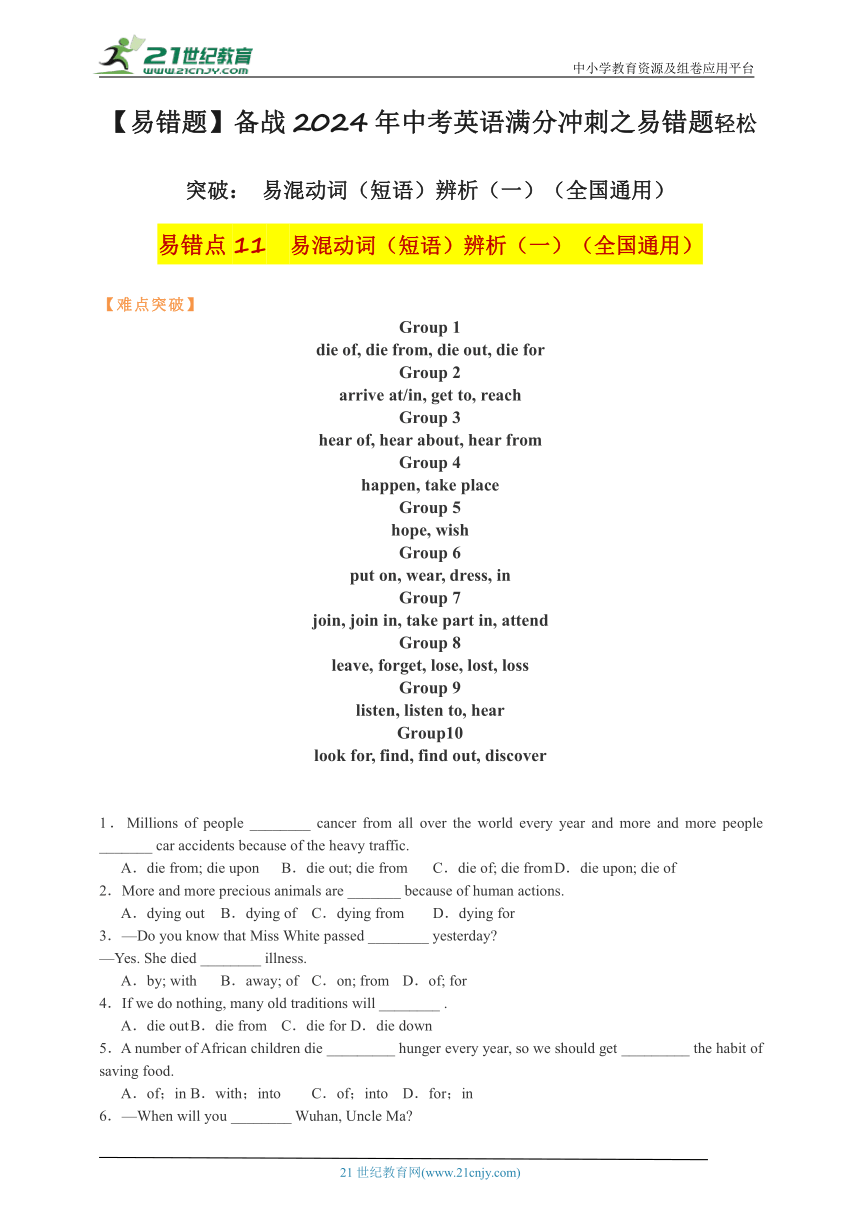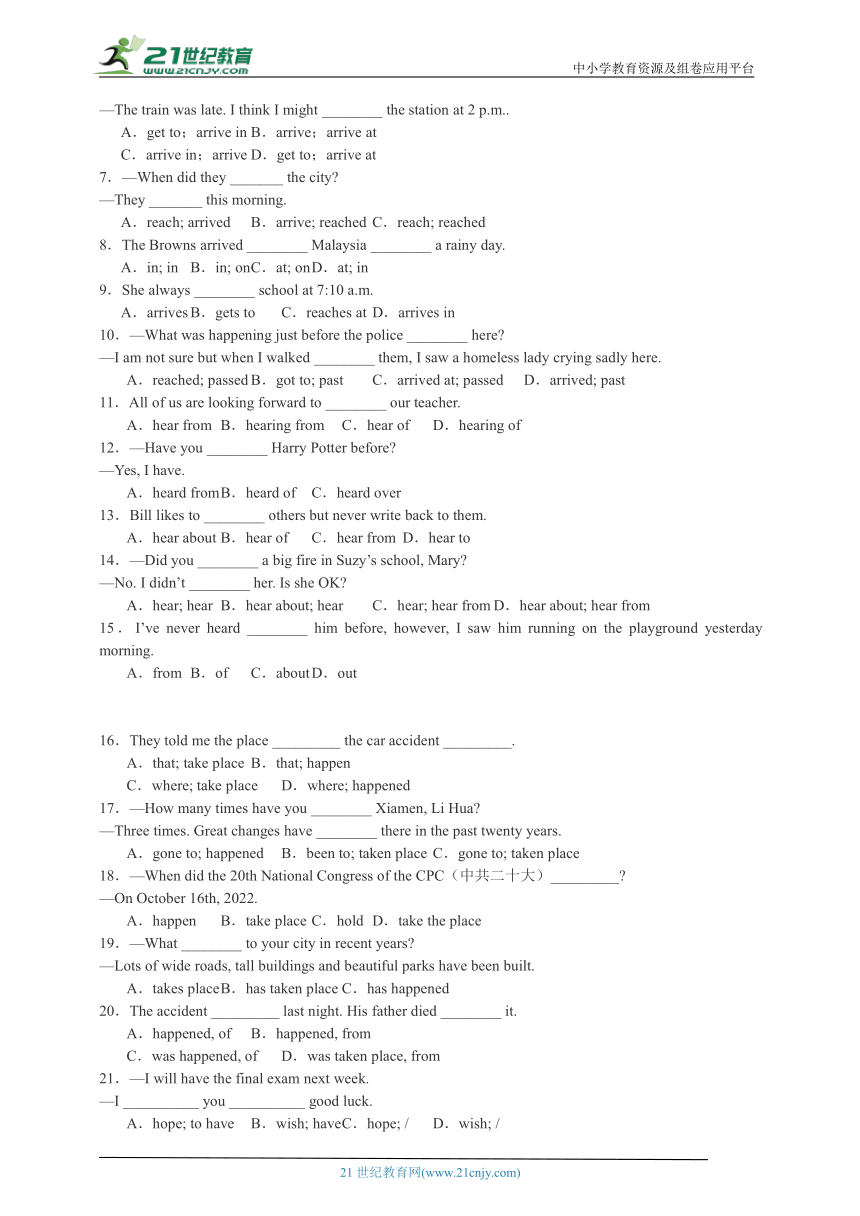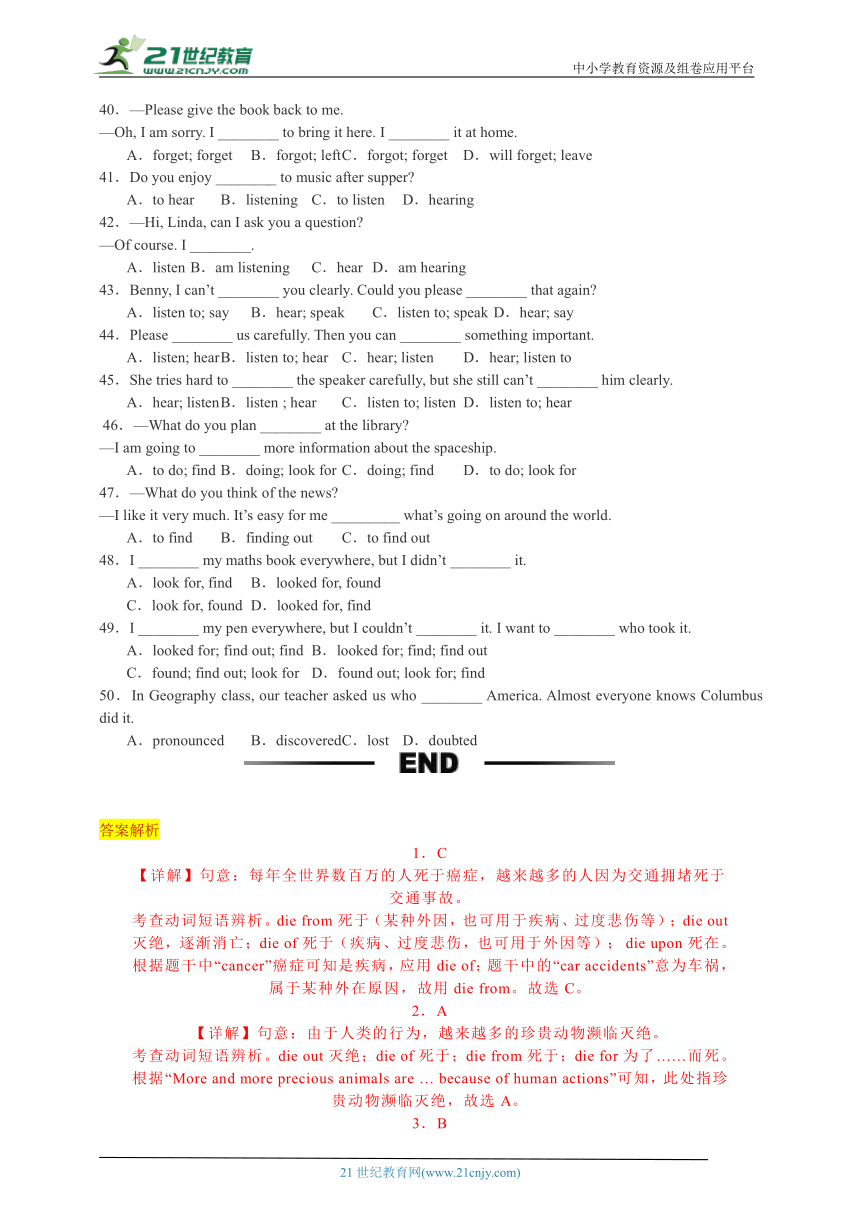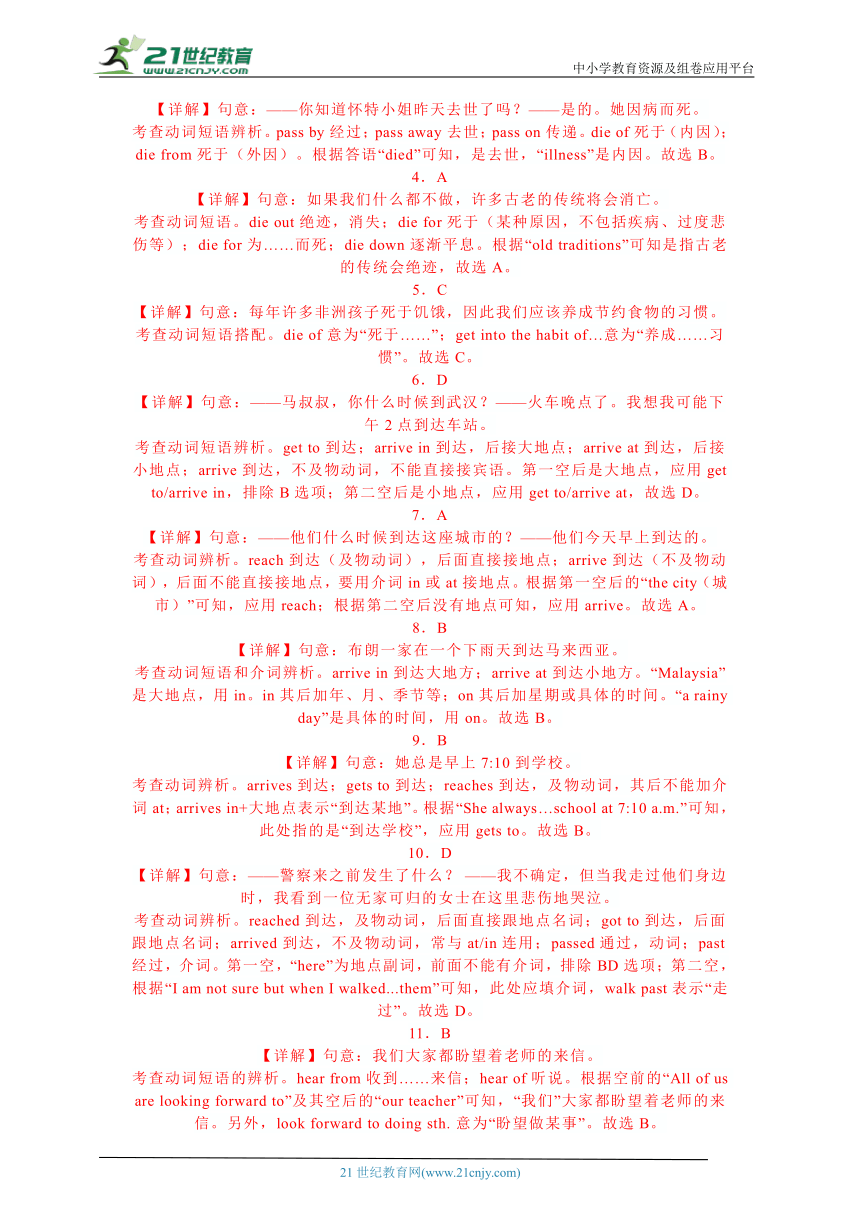【满分冲刺之易错题轻松突破】备战2024年中考英语:11 易混动词(短语)辨析(一)(全国通用)(含解析)
文档属性
| 名称 | 【满分冲刺之易错题轻松突破】备战2024年中考英语:11 易混动词(短语)辨析(一)(全国通用)(含解析) |  | |
| 格式 | docx | ||
| 文件大小 | 288.3KB | ||
| 资源类型 | 试卷 | ||
| 版本资源 | 通用版 | ||
| 科目 | 英语 | ||
| 更新时间 | 2024-05-08 15:04:37 | ||
图片预览





文档简介
中小学教育资源及组卷应用平台
【易错题】备战2024年中考英语满分冲刺之易错题轻松突破: 易混动词(短语)辨析(一)(全国通用)
易错点11 易混动词(短语)辨析(一)(全国通用)
【难点突破】
Group 1
die of, die from, die out, die for
Group 2
arrive at/in, get to, reach
Group 3
hear of, hear about, hear from
Group 4
happen, take place
Group 5
hope, wish
Group 6
put on, wear, dress, in
Group 7
join, join in, take part in, attend
Group 8
leave, forget, lose, lost, loss
Group 9
listen, listen to, hear
Group10
look for, find, find out, discover
1.Millions of people ________ cancer from all over the world every year and more and more people _______ car accidents because of the heavy traffic.
A.die from; die upon B.die out; die from C.die of; die from D.die upon; die of
2.More and more precious animals are _______ because of human actions.
A.dying out B.dying of C.dying from D.dying for
3.—Do you know that Miss White passed ________ yesterday
—Yes. She died ________ illness.
A.by; with B.away; of C.on; from D.of; for
4.If we do nothing, many old traditions will ________ .
A.die out B.die from C.die for D.die down
5.A number of African children die _________ hunger every year, so we should get _________ the habit of saving food.
A.of;in B.with;into C.of;into D.for;in
6.—When will you ________ Wuhan, Uncle Ma
—The train was late. I think I might ________ the station at 2 p.m..
A.get to;arrive in B.arrive;arrive at
C.arrive in;arrive D.get to;arrive at
7.—When did they _______ the city
—They _______ this morning.
A.reach; arrived B.arrive; reached C.reach; reached
8.The Browns arrived ________ Malaysia ________ a rainy day.
A.in; in B.in; on C.at; on D.at; in
9.She always ________ school at 7:10 a.m.
A.arrives B.gets to C.reaches at D.arrives in
10.—What was happening just before the police ________ here
—I am not sure but when I walked ________ them, I saw a homeless lady crying sadly here.
A.reached; passed B.got to; past C.arrived at; passed D.arrived; past
11.All of us are looking forward to ________ our teacher.
A.hear from B.hearing from C.hear of D.hearing of
12.—Have you ________ Harry Potter before
—Yes, I have.
A.heard from B.heard of C.heard over
13.Bill likes to ________ others but never write back to them.
A.hear about B.hear of C.hear from D.hear to
14.—Did you ________ a big fire in Suzy’s school, Mary
—No. I didn’t ________ her. Is she OK
A.hear; hear B.hear about; hear C.hear; hear from D.hear about; hear from
15.I’ve never heard ________ him before, however, I saw him running on the playground yesterday morning.
A.from B.of C.about D.out
16.They told me the place _________ the car accident _________.
A.that; take place B.that; happen
C.where; take place D.where; happened
17.—How many times have you ________ Xiamen, Li Hua
—Three times. Great changes have ________ there in the past twenty years.
A.gone to; happened B.been to; taken place C.gone to; taken place
18.—When did the 20th National Congress of the CPC(中共二十大)_________
—On October 16th, 2022.
A.happen B.take place C.hold D.take the place
19.—What ________ to your city in recent years
—Lots of wide roads, tall buildings and beautiful parks have been built.
A.takes place B.has taken place C.has happened
20.The accident _________ last night. His father died ________ it.
A.happened, of B.happened, from
C.was happened, of D.was taken place, from
21.—I will have the final exam next week.
—I __________ you __________ good luck.
A.hope; to have B.wish; have C.hope; / D.wish; /
22.—Emily, here’s a dictionary. I __________ it will help you.
—Thank you. It’s just __________ I need.
A.wish; that B.hope; what C.want; which D.think; how
23.I hope ________ the volleyball match. I ________ our team good luck.
A.us to win; wish B.we will win; wish
C.we to win; hope D.we will win; hope
24.He hopes ________ in Nanjing University in the future.
A.him to study B.studies C.he can study D.he to study
25.The teacher ________ Tom to pass the English exam.
A.wishes B.hopes C.will wish D.will hope
26.The man ________ a blue coat is standing ________ my father.
A.wears; in front of B.in, in the front of
C.in, in front of D.wears, in the front of
27.My brother likes to ________ black shirts.
A.in B.put on C.wear D.dress
28.—It is very cold outside, dear. You have to ________ your warm jacket.
—OK. I will, Mom.
A.put on B.dress up C.try on D.get dressed
29.—I want to ________ up as a monkey for the party.
— You’d better ________ a warm coat. It’s snowing.
A.wear; dress B.dress; put on C.wear; put on D.dress; dress
30.—Paul, your sister is so helpful.
—Yes, she often ________ her brother Jim when mum goes out.
A.wears B.dresses C.puts on D.has on
31.—Are you going to _________ our English team
—Yes, I am.
A.take part in B.join C.join in
32.—Did Kate come to your birthday party yesterday
—No, she didn’t. But she ________ us for dinner.
A.took part in B.joined in C.joined
33.John didn’t __________ the class meeting yesterday because he was ill.
A.attend B.join C.take part in D.join in
34.All students are invited to ________ the party on Saturday night.
A.like B.keep C.join in D.leave
35.All the students in Class Five ________ an English contest.
A.joined B.took part in C.attended D.take part
36.Many wild animals ________ their lives because of the ________ of living areas.
A.loss; lose B.lose; lose C.loss; loss D.lose; loss
37.—Mr. Mark, I’m terribly sorry to ________ my backpack at home.
—It’s OK, but don’t ________ to bring it here tomorrow.
A.leave; forget B.leave; lose C.forget; forget
38.The young man in yellow ________ his keys in his office. He is forgetful and can’t enter the house.
A.left B.forgot C.has left D.has forgotten
39.—I’m sorry I ________ my exercise book at home.
—Don’t forget _________ it to school tomorrow, please.
A.left; to bring B.forgot; to take C.forgot; to bring D.left; to take
40.—Please give the book back to me.
—Oh, I am sorry. I ________ to bring it here. I ________ it at home.
A.forget; forget B.forgot; left C.forgot; forget D.will forget; leave
41.Do you enjoy ________ to music after supper
A.to hear B.listening C.to listen D.hearing
42.—Hi, Linda, can I ask you a question
—Of course. I ________.
A.listen B.am listening C.hear D.am hearing
43.Benny, I can’t ________ you clearly. Could you please ________ that again
A.listen to; say B.hear; speak C.listen to; speak D.hear; say
44.Please ________ us carefully. Then you can ________ something important.
A.listen; hear B.listen to; hear C.hear; listen D.hear; listen to
45.She tries hard to ________ the speaker carefully, but she still can’t ________ him clearly.
A.hear; listen B.listen ; hear C.listen to; listen D.listen to; hear
46.—What do you plan ________ at the library
—I am going to ________ more information about the spaceship.
A.to do; find B.doing; look for C.doing; find D.to do; look for
47.—What do you think of the news
—I like it very much. It’s easy for me _________ what’s going on around the world.
A.to find B.finding out C.to find out
48.I ________ my maths book everywhere, but I didn’t ________ it.
A.look for, find B.looked for, found
C.look for, found D.looked for, find
49.I ________ my pen everywhere, but I couldn’t ________ it. I want to ________ who took it.
A.looked for; find out; find B.looked for; find; find out
C.found; find out; look for D.found out; look for; find
50.In Geography class, our teacher asked us who ________ America. Almost everyone knows Columbus did it.
A.pronounced B.discovered C.lost D.doubted
答案解析
1.C
【详解】句意:每年全世界数百万的人死于癌症,越来越多的人因为交通拥堵死于交通事故。
考查动词短语辨析。die from死于(某种外因,也可用于疾病、过度悲伤等);die out灭绝,逐渐消亡;die of死于(疾病、过度悲伤,也可用于外因等); die upon死在。根据题干中“cancer”癌症可知是疾病,应用die of;题干中的“car accidents”意为车祸,属于某种外在原因,故用die from。故选C。
2.A
【详解】句意:由于人类的行为,越来越多的珍贵动物濒临灭绝。
考查动词短语辨析。die out灭绝;die of死于;die from死于;die for为了……而死。根据“More and more precious animals are … because of human actions”可知,此处指珍贵动物濒临灭绝,故选A。
3.B
【详解】句意:——你知道怀特小姐昨天去世了吗?——是的。她因病而死。
考查动词短语辨析。pass by经过;pass away去世;pass on传递。die of死于(内因);die from死于(外因)。根据答语“died”可知,是去世,“illness”是内因。故选B。
4.A
【详解】句意:如果我们什么都不做,许多古老的传统将会消亡。
考查动词短语。die out绝迹,消失;die for死于(某种原因,不包括疾病、过度悲伤等);die for为……而死;die down逐渐平息。根据“old traditions”可知是指古老的传统会绝迹,故选A。
5.C
【详解】句意:每年许多非洲孩子死于饥饿,因此我们应该养成节约食物的习惯。
考查动词短语搭配。die of 意为“死于……”;get into the habit of…意为“养成……习惯”。故选C。
6.D
【详解】句意:——马叔叔,你什么时候到武汉?——火车晚点了。我想我可能下午2点到达车站。
考查动词短语辨析。get to到达;arrive in到达,后接大地点;arrive at到达,后接小地点;arrive到达,不及物动词,不能直接接宾语。第一空后是大地点,应用get to/arrive in,排除B选项;第二空后是小地点,应用get to/arrive at,故选D。
7.A
【详解】句意:——他们什么时候到达这座城市的?——他们今天早上到达的。
考查动词辨析。reach到达(及物动词),后面直接接地点;arrive到达(不及物动词),后面不能直接接地点,要用介词in或at接地点。根据第一空后的“the city(城市)”可知,应用reach;根据第二空后没有地点可知,应用arrive。故选A。
8.B
【详解】句意:布朗一家在一个下雨天到达马来西亚。
考查动词短语和介词辨析。arrive in到达大地方;arrive at到达小地方。“Malaysia”是大地点,用in。in其后加年、月、季节等;on其后加星期或具体的时间。“a rainy day”是具体的时间,用on。故选B。
9.B
【详解】句意:她总是早上7:10到学校。
考查动词辨析。arrives到达;gets to到达;reaches到达,及物动词,其后不能加介词at;arrives in+大地点表示“到达某地”。根据“She always…school at 7:10 a.m.”可知,此处指的是“到达学校”,应用gets to。故选B。
10.D
【详解】句意:——警察来之前发生了什么? ——我不确定,但当我走过他们身边时,我看到一位无家可归的女士在这里悲伤地哭泣。
考查动词辨析。reached到达,及物动词,后面直接跟地点名词;got to到达,后面跟地点名词;arrived到达,不及物动词,常与at/in连用;passed通过,动词;past经过,介词。第一空,“here”为地点副词,前面不能有介词,排除BD选项;第二空,根据“I am not sure but when I walked...them”可知,此处应填介词,walk past表示“走过”。故选D。
11.B
【详解】句意:我们大家都盼望着老师的来信。
考查动词短语的辨析。hear from收到……来信;hear of听说。根据空前的“All of us are looking forward to”及其空后的“our teacher”可知,“我们”大家都盼望着老师的来信。另外,look forward to doing sth. 意为“盼望做某事”。故选B。
12.B
【详解】句意:——你以前听说过哈利波特吗?——是的,我听说过。
考查动词短语。heard from收到某人的来信;heard of听说;heard over是错误搭配。根据“Have you ... Harry Potter before ”可知,此处指听说过哈利波特吗,应用heard of。故选B。
13.C
【详解】句意:比尔喜欢收到别人的来信,但从不给他们回信。
考查动词短语辨析。hear about听说,得知;hear of听说;hear from收到……来信;hear to不肯听。由句中“but never write back to them”知,此句是说比尔喜欢收到别人的来信,故选C。
14.D
【详解】句意:——Mary,你听说Suzy的学校发生大火了吗?——没有,我没有收到她的消息。她还好吗?
考查词义辨析。hear听见;hear about听说;hear from收到……的来信,收到……的消息。根据“Did you…a big fire in Suzy’s school, Mary ”可知第一个空格处填hear about“听说”;根据“No. I didn’t...her.”可知第二个空格处填hear from“得到(某人的)消息”符合语境,故选D。
15.B
【详解】句意:我以前从未听说过他,但是昨天早上我看到他在操场上跑步。
考查介词的辨析。hear from收到……的来信;hear of听说;hear about耳闻;hear out听完。根据“however, I saw him running on the playground yesterday morning.”可知,昨天早上在操场上看见他,可见上句表达的是之前从未听说过他,“听说”hear of,需用介词of。故选B。
16.D
【详解】考查定语从句与动词。句意:他们告诉我发生事故的地方。The place 是先行词,where引导一个定语从句,take place 表示“发生、举行、举办”,一般指非偶然性事件的“发生”,即这种事件的发生一定有某种原因或事先的安排,例如: Great changes have taken place in our hometown during the past ten years. happen作“发生、碰巧”解,一般用于偶然或突发性事件,例如 Maybe something unexpected happened. 故选D项。
17.B
【详解】句意:——李华,你去过厦门几次了?——三次。在过去的二十年里,那里发生了巨大的变化。
考查have gone to和have been to的区别,happen和take place的辨析。have gone to已经去了(还未回来);have been to曾经去过(已回来);happen发生,碰巧(一般用于偶然或突发性事件);take place发生(一般用于非偶然性事件的发生)。根据“How many times have you...Xiamen”可知,此处询问的是去过几次(即已回来),应用have been to;根据“Great changes have...there in the past twenty years.”可知,一个地方过去二十年的变化并不都是偶然发生的,taken place符合语境。故选B。
18.B
【详解】句意:——中国共产党第二十次全国代表大会是什么时候召开的?——2022年10月16日。
考查动词辨析。happen发生,使遭遇,碰巧; take place发生,举行,指某件事情发生或某个活动举行;hold召开,举行,进行;take the place代替某人或某物。主语20th National Congress of the CPC与动词hold之间存在被动关系,若用hold需用被动语态,这里应用take place,故选B。
19.C
【详解】句意:——你的城市近些年发生了什么?——修建了许多宽阔的道路、高大的建筑和美丽的公园。
考查动词时态和动词短语。根据“in recent years”和“…parks have been built”可知原句是现在完成时,其结构为have/has done,排除A项;what happened to sth./sb.“……发生了什么”,是固定句型。故选C。
20.B
【详解】句意:事故发生在昨晚。他的父亲因此而死。
考查被动语态和动词短语。happen发生;take place发生。两个动词都不用于被动语态,排除CD;die of多用于指疾病、衰老等内部原因导致的死亡;die from指外部原因造成的死亡。事故是外部原因,应用die from。故选B。
21.D
【详解】句意:——下周我要期末考试。——祝你好运。
考查动词辨析。hope希望,后加动词不定式作宾语,或宾语从句,且不可用结构hope sb. to do sth.,排除AC;wish希望,wish sb. to do sth.“希望某人做某事”,排除B;wish sb. good luck“祝某人好运”,固定用法。故选D。
22.B
【详解】句意:——艾米丽,这有本字典。我希望这对你有帮助。——谢谢。这正是我所需要的。
考查动词辨析和宾语从句。wish希望;hope希望;want想要;think认为。分析第二处,此处是宾语从句,引导词在从句中作宾语,排除AD;want不直接加从句,故选B。
23.B
【详解】句意:我希望我们能赢得这场排球比赛。祝我们队好运。
考查hope和wish的用法。第一空,hope可用于hope to do sth.结构,但不能用于hope sb. to do sth.结构,排除AC选项,hope可接省略that的宾语从句,选项BD的“we will win”是hope后接宾语从句的用法,符合语法及语境;第二空,“our team good luck”为双宾语,wish能接双宾语表示祝愿,而hope不能接双宾语。故选B。
24.C
【详解】句意:他希望将来能在南京大学学习。
考查动词hope的用法。hope的用法:hope to do sth或接宾语从句,不能接sb to do sth,四个选项中只有C选项结构正确,故选C。
25.A
【详解】句意:老师希望Tom通过英语考试。
考查动词辨析及时态。根据“Tom to pass the English exam.”可知,此处是固定用法wish sb. to do sth. 意为“希望某人做某事,没有hope sb. to do sth. 这一结构,且根据语境知应用一般现在时。此空应填wishes,故选A。
26.C
【详解】句意:穿蓝色外套的男人站在我父亲前面。
考查介词和短语用法。wears穿着;in也可表示穿着;in front of在……前面,外部的前面;in the front of在内部前面。原句有be动词is,因此第一个用介词,而不是谓语动词;根据“my father”可知此处指站在父亲前面,外部的前面。故选C。
27.C
【详解】句意:我哥哥喜欢穿黑色衬衣。
考查动词辨析。in穿着,介词;put on穿上,表示“穿的动作”;wear穿着,表示“穿的状态”;dress给某人穿衣服,后面接人。根据“likes to...black shirts”,like to do sth.,横线处填动词原形,且表示“穿的状态”,故选C。
28.A
【详解】句意:——亲爱的,外面很冷。你必须穿上暖和的夹克。——好的。我会的,妈妈。
考查动词短语辨析。put on穿上;dress up打扮;try on试穿;get dressed穿衣服。根据“It is very cold outside”可知,此处说的是“穿上暖和的夹克”,故选A。
29.B
【详解】——我想在聚会上打扮成猴子。——你最好穿上一件暖和的外套。正在下雪。
考查动词和动词短语辨析。wear穿,表示穿的状态;put on穿上,强调穿的动作;dress穿衣服,给某人穿衣;短语dress up as为固定搭配,意为“装扮成……”,符合情境;第二空强调穿的动作,用put on表示。故选B。
30.B
【详解】句意:——保罗,你姐姐真是乐于助人。——是的,妈妈外出时,她经常给她弟弟吉姆穿衣服。
考查动词辨析。wears穿,表示穿的状态;dresses穿,后面加人,表示给某人穿衣服;puts on穿上,表示穿的动作;has on表示穿着。根据空后的“ her brother”可知,此处表示给某人穿衣服,故选B。
31.B
【详解】句意:——你打算加入我们的英语队吗?——是的。
考查动词和动词短语辨析。take part in参加,常指参加活动、比赛或聚会等;join加入,指加入组织或团体;join in参加,指参加游戏、活动等。由空后“our English team”可知,A、C不符合语境。故选B。
32.C
【详解】句意:——凯特昨天参加你的生日聚会了吗? ——不,她没有。但她和我们一起吃晚饭了。
考查动词短语和动词辨析。took part in参与某项活动或事件,强调个人的积极参与;joined in加入或参与某项活动或事件,强调加入到一个群体或团体中;joined加入,表示与某人在一起或伴随某人做某事。根据句子可知,此处是join sb. (in sth./ doing sth. ),表示和某人一起做某事。故选C。
33.A
【详解】句意:约翰昨天没有参加班会,因为他病了。
考查动词辨析。attend出席、参加、上课;join加入(表示加入某个政党、团体、组织等,并成为其中的成员);take part in参加(指“参加”会议、考试、竞赛或群众性活动,重在说明句子主语参加该项活动并在其中发挥作用);join in参加(某项运动或活动)。结合语境可知,此处应是上班会课。故选A。
34.C
【详解】句意:所有的学生都被邀请参加周六晚上的聚会。
考查动词辨析。like喜欢;keep保持;join in参加;leave离开。根据“All students are invited to…the party”可知,学生们被邀请参加聚会。故选C。
35.B
【详解】句意:五班的所有学生都参加了一场英语比赛。
考查动词(短语)辨析。joined加入,通常指加入俱乐部、组织等;took part in参加,通常是参加活动;attended参加,通常表示参加会议;entered进入,走进。根据“an English contest”可知,这是一场活动。故选B。
36.D
【详解】句意:许多野生动物因为失去了生存区而失去了生命。
考查动词和名词用法。lose失去,是动词;loss丧失,是名词。第一空需要作谓语,应用动词lose;第二空被冠词the修饰,应用名词loss,故选D。
37.A
【详解】句意:——马克先生,非常抱歉我把背包落在家里了。——没关系,不过别忘了明天带来。
考查动词辨析。leave把某人或某物留在某处;forget忘记;lose失去。根据“I’m terribly sorry to...my backpack at home.”可知,此处指把背包落在家里,用leave;根据“don’t...to bring it here tomorrow.”可知,此处马克先生提醒“我”要带背包,即“别忘记明天把背包带来”,用forget。故选A。
38.C
【详解】句意:那个穿黄色衣服的年轻人把钥匙忘在办公室了。他健忘,不能进屋。
考查动词时态。left忘带,一般过去时;forgot忘记,一般过去时;has left忘了带,现在完成时;has forgotten忘记了,现在完成时。leave sth. in+地点“把某物落在某地”,forget sth.“忘记某事”,根据句意可知,此处表示的是那个穿黄色衣服的年轻人把钥匙忘在办公室了,所以可排除B项和D项;根据空后的“He is forgetful and can’t enter the house.”可知,落钥匙的动作发生在过去,对现在造成的影响是他进不去房子,用现在完成时have done,主语为The young man ,所以谓语动词应用第三人称单数形式。故选C。
39.A
【详解】句意:——我很抱歉,我把我的练习书落在家里了。——请不要忘记明天把它带到学校。
考查动词辨析。leave意为“丢下,遗忘”。由句中“I’m sorry”和“Don’t forget”可推出,练习册应该是落在家里。leave sth. at home表示“把某物落家里了”,这一动作是在说话之前发生的,故用一般过去时,第一个空填leave的过去式left。forget to do sth.表示“忘记做某事”,因忘带了,需要带来,bring“带来”,take“拿走”。故第二个空填to bring。故选A。
40.B
【详解】句意:——请把那本书还给我。——哦,对不起。我忘了把它带这里。我把它落在家里了。
考查动词和时态。forget忘记;leave遗留,落下。根据“I am sorry.”可知,此处表示我现在无法归还那本书,因此把它忘了带来,忘了带这本书应是发生在说话之前,是在过去,故第一个空用一般过去时,排除AD;把它落在家里用动词leave,故选B。
41.B
【详解】句意:你喜欢晚饭后听音乐吗
考查动名词和动词辨析。to hear“听见”,不定式,强调听的结果;listening“听”,动名词或现在分词,强调听的动作;to listen“听”,不定式;hearing“听见”,动名词或现在分词。enjoy doing sth.“喜欢做某事”,固定搭配,排除A和C;listen to music“听音乐”,固定搭配,排除D。故选B。
42.B
【详解】句意:——嗨,琳达,我能问你一个问题吗? ——当然。我在听。
考查现在进行时和动词词义辨析。listen听,强调动作,一般现在时;am listening正在听,现在进行时;hear听到,强调听的结果,一般现在时;am hearing正在听到,现在进行时。由语境可知,此处强调听的动作,并且是现在正在听。故选B。
43.D
【详解】句意:Benny,我听不清你说话。能不能请你再说一遍?
考查动词辨析。listen to sth听某东西(强调动作);hear听见;speak说话(常作不及物,及物常加语言);say说(作及物,常加说话的内容)。根据“I can’t...you clearly”可知,此处表达“我没听清楚、没听见”,用hear。根据句子“Could you please ...that again ”可知,此处在请求别人重新说一遍,that为说的内容,因此用say。故选D。
44.B
【详解】句意:请仔细听我们说,你就会听到重要的事情。
考查动词辨析。listen听,不及物动词;listen to sb听某人说话,强调“听”的动作;hear听见,强调“听”的结果。第一句,根据“us carefully”可知,强调“听”的动作;第二句根据“something important”可知,强调“听”的结果,故选B。
45.D
【详解】句意:她很努力地仔细听演讲者讲话,但还是听不清楚。
考查动词。hear听见,强调结果;listen听,强调动作,是不及物动词,接宾语时用listen to。第一空强调去听,后面接宾语the speaker,因此用listen to;第二空表示听见他的话,表示结果,用动词hear,故选D。
46.D
【详解】句意:——你打算在图书馆里做什么?——我打算找更多关于宇宙飞船的信息。
考查动词不定式作宾语和动词辨析。to do动词不定式;doing动名词或现在分词;find找到(强调结果);look for寻找(强调动作)。动词短语plan to do表示“计划做某事”,因此第一空应填入动词不定式to do作宾语;根据“I am going to”可知此处应用动词短语look for表示“寻找”,强调要去找的这个动作。故选D。
47.C
【详解】句意:——你觉得这个消息怎么样?——我非常喜欢它。对我来说,了解世界各地发生的事情很容易。
考查非谓语动词以及动词短语。此处是结构it is adj. for sb. to do sth.“做某事对某人来说是……的”,排除B;find找到;find out查明。根据“what’s going on around the world”可知是查明世界各地发生了什么,用动词短语find out。故选C。
48.D
【详解】句意:我到处找我的数学书,但没有找到。
考查动词辨析。look for寻找,强调动作;find找到,强调结果。根据“my maths book everywhere”可知,是到处寻找数学书,强调动作,结合语境可知,该句为一般过去时,所以用looked for;根据“I didn’t...it”可知,此处指没有找到,强调结果,助动词didn’t后用动词原形,所以用find,故选D。
49.B
【详解】句意:我到处找我的钢笔,但我找不到。我要查出是谁拿的。
考查动词以及动词短语辨析。look for寻找,强调动作;find寻找,强调结果;find out查明。根据“my pen everywhere”可知,第一空强调找钢笔的动作,所以第一空填looked for;根据“but I couldn’t … it.”可知,第二空强调没有找到的结果,所以第二空填find;根据“I want to … who took it”可知,第三空指想查出谁拿的,故选B。
50.B
【详解】句意:地理课上,老师问我们谁发现了美洲。几乎每个人都知道是哥伦布做的。
考查动词辨析。pronounced发音;discovered发现,找到;lost遗失,丢失;doubted怀疑。根据“who ...America. Almost everyone knows Columbus did it.”可知,是哥伦布发现了美洲大陆,故选B。
21世纪教育网 www.21cnjy.com 精品试卷·第 2 页 (共 2 页)
21世纪教育网(www.21cnjy.com)
【易错题】备战2024年中考英语满分冲刺之易错题轻松突破: 易混动词(短语)辨析(一)(全国通用)
易错点11 易混动词(短语)辨析(一)(全国通用)
【难点突破】
Group 1
die of, die from, die out, die for
Group 2
arrive at/in, get to, reach
Group 3
hear of, hear about, hear from
Group 4
happen, take place
Group 5
hope, wish
Group 6
put on, wear, dress, in
Group 7
join, join in, take part in, attend
Group 8
leave, forget, lose, lost, loss
Group 9
listen, listen to, hear
Group10
look for, find, find out, discover
1.Millions of people ________ cancer from all over the world every year and more and more people _______ car accidents because of the heavy traffic.
A.die from; die upon B.die out; die from C.die of; die from D.die upon; die of
2.More and more precious animals are _______ because of human actions.
A.dying out B.dying of C.dying from D.dying for
3.—Do you know that Miss White passed ________ yesterday
—Yes. She died ________ illness.
A.by; with B.away; of C.on; from D.of; for
4.If we do nothing, many old traditions will ________ .
A.die out B.die from C.die for D.die down
5.A number of African children die _________ hunger every year, so we should get _________ the habit of saving food.
A.of;in B.with;into C.of;into D.for;in
6.—When will you ________ Wuhan, Uncle Ma
—The train was late. I think I might ________ the station at 2 p.m..
A.get to;arrive in B.arrive;arrive at
C.arrive in;arrive D.get to;arrive at
7.—When did they _______ the city
—They _______ this morning.
A.reach; arrived B.arrive; reached C.reach; reached
8.The Browns arrived ________ Malaysia ________ a rainy day.
A.in; in B.in; on C.at; on D.at; in
9.She always ________ school at 7:10 a.m.
A.arrives B.gets to C.reaches at D.arrives in
10.—What was happening just before the police ________ here
—I am not sure but when I walked ________ them, I saw a homeless lady crying sadly here.
A.reached; passed B.got to; past C.arrived at; passed D.arrived; past
11.All of us are looking forward to ________ our teacher.
A.hear from B.hearing from C.hear of D.hearing of
12.—Have you ________ Harry Potter before
—Yes, I have.
A.heard from B.heard of C.heard over
13.Bill likes to ________ others but never write back to them.
A.hear about B.hear of C.hear from D.hear to
14.—Did you ________ a big fire in Suzy’s school, Mary
—No. I didn’t ________ her. Is she OK
A.hear; hear B.hear about; hear C.hear; hear from D.hear about; hear from
15.I’ve never heard ________ him before, however, I saw him running on the playground yesterday morning.
A.from B.of C.about D.out
16.They told me the place _________ the car accident _________.
A.that; take place B.that; happen
C.where; take place D.where; happened
17.—How many times have you ________ Xiamen, Li Hua
—Three times. Great changes have ________ there in the past twenty years.
A.gone to; happened B.been to; taken place C.gone to; taken place
18.—When did the 20th National Congress of the CPC(中共二十大)_________
—On October 16th, 2022.
A.happen B.take place C.hold D.take the place
19.—What ________ to your city in recent years
—Lots of wide roads, tall buildings and beautiful parks have been built.
A.takes place B.has taken place C.has happened
20.The accident _________ last night. His father died ________ it.
A.happened, of B.happened, from
C.was happened, of D.was taken place, from
21.—I will have the final exam next week.
—I __________ you __________ good luck.
A.hope; to have B.wish; have C.hope; / D.wish; /
22.—Emily, here’s a dictionary. I __________ it will help you.
—Thank you. It’s just __________ I need.
A.wish; that B.hope; what C.want; which D.think; how
23.I hope ________ the volleyball match. I ________ our team good luck.
A.us to win; wish B.we will win; wish
C.we to win; hope D.we will win; hope
24.He hopes ________ in Nanjing University in the future.
A.him to study B.studies C.he can study D.he to study
25.The teacher ________ Tom to pass the English exam.
A.wishes B.hopes C.will wish D.will hope
26.The man ________ a blue coat is standing ________ my father.
A.wears; in front of B.in, in the front of
C.in, in front of D.wears, in the front of
27.My brother likes to ________ black shirts.
A.in B.put on C.wear D.dress
28.—It is very cold outside, dear. You have to ________ your warm jacket.
—OK. I will, Mom.
A.put on B.dress up C.try on D.get dressed
29.—I want to ________ up as a monkey for the party.
— You’d better ________ a warm coat. It’s snowing.
A.wear; dress B.dress; put on C.wear; put on D.dress; dress
30.—Paul, your sister is so helpful.
—Yes, she often ________ her brother Jim when mum goes out.
A.wears B.dresses C.puts on D.has on
31.—Are you going to _________ our English team
—Yes, I am.
A.take part in B.join C.join in
32.—Did Kate come to your birthday party yesterday
—No, she didn’t. But she ________ us for dinner.
A.took part in B.joined in C.joined
33.John didn’t __________ the class meeting yesterday because he was ill.
A.attend B.join C.take part in D.join in
34.All students are invited to ________ the party on Saturday night.
A.like B.keep C.join in D.leave
35.All the students in Class Five ________ an English contest.
A.joined B.took part in C.attended D.take part
36.Many wild animals ________ their lives because of the ________ of living areas.
A.loss; lose B.lose; lose C.loss; loss D.lose; loss
37.—Mr. Mark, I’m terribly sorry to ________ my backpack at home.
—It’s OK, but don’t ________ to bring it here tomorrow.
A.leave; forget B.leave; lose C.forget; forget
38.The young man in yellow ________ his keys in his office. He is forgetful and can’t enter the house.
A.left B.forgot C.has left D.has forgotten
39.—I’m sorry I ________ my exercise book at home.
—Don’t forget _________ it to school tomorrow, please.
A.left; to bring B.forgot; to take C.forgot; to bring D.left; to take
40.—Please give the book back to me.
—Oh, I am sorry. I ________ to bring it here. I ________ it at home.
A.forget; forget B.forgot; left C.forgot; forget D.will forget; leave
41.Do you enjoy ________ to music after supper
A.to hear B.listening C.to listen D.hearing
42.—Hi, Linda, can I ask you a question
—Of course. I ________.
A.listen B.am listening C.hear D.am hearing
43.Benny, I can’t ________ you clearly. Could you please ________ that again
A.listen to; say B.hear; speak C.listen to; speak D.hear; say
44.Please ________ us carefully. Then you can ________ something important.
A.listen; hear B.listen to; hear C.hear; listen D.hear; listen to
45.She tries hard to ________ the speaker carefully, but she still can’t ________ him clearly.
A.hear; listen B.listen ; hear C.listen to; listen D.listen to; hear
46.—What do you plan ________ at the library
—I am going to ________ more information about the spaceship.
A.to do; find B.doing; look for C.doing; find D.to do; look for
47.—What do you think of the news
—I like it very much. It’s easy for me _________ what’s going on around the world.
A.to find B.finding out C.to find out
48.I ________ my maths book everywhere, but I didn’t ________ it.
A.look for, find B.looked for, found
C.look for, found D.looked for, find
49.I ________ my pen everywhere, but I couldn’t ________ it. I want to ________ who took it.
A.looked for; find out; find B.looked for; find; find out
C.found; find out; look for D.found out; look for; find
50.In Geography class, our teacher asked us who ________ America. Almost everyone knows Columbus did it.
A.pronounced B.discovered C.lost D.doubted
答案解析
1.C
【详解】句意:每年全世界数百万的人死于癌症,越来越多的人因为交通拥堵死于交通事故。
考查动词短语辨析。die from死于(某种外因,也可用于疾病、过度悲伤等);die out灭绝,逐渐消亡;die of死于(疾病、过度悲伤,也可用于外因等); die upon死在。根据题干中“cancer”癌症可知是疾病,应用die of;题干中的“car accidents”意为车祸,属于某种外在原因,故用die from。故选C。
2.A
【详解】句意:由于人类的行为,越来越多的珍贵动物濒临灭绝。
考查动词短语辨析。die out灭绝;die of死于;die from死于;die for为了……而死。根据“More and more precious animals are … because of human actions”可知,此处指珍贵动物濒临灭绝,故选A。
3.B
【详解】句意:——你知道怀特小姐昨天去世了吗?——是的。她因病而死。
考查动词短语辨析。pass by经过;pass away去世;pass on传递。die of死于(内因);die from死于(外因)。根据答语“died”可知,是去世,“illness”是内因。故选B。
4.A
【详解】句意:如果我们什么都不做,许多古老的传统将会消亡。
考查动词短语。die out绝迹,消失;die for死于(某种原因,不包括疾病、过度悲伤等);die for为……而死;die down逐渐平息。根据“old traditions”可知是指古老的传统会绝迹,故选A。
5.C
【详解】句意:每年许多非洲孩子死于饥饿,因此我们应该养成节约食物的习惯。
考查动词短语搭配。die of 意为“死于……”;get into the habit of…意为“养成……习惯”。故选C。
6.D
【详解】句意:——马叔叔,你什么时候到武汉?——火车晚点了。我想我可能下午2点到达车站。
考查动词短语辨析。get to到达;arrive in到达,后接大地点;arrive at到达,后接小地点;arrive到达,不及物动词,不能直接接宾语。第一空后是大地点,应用get to/arrive in,排除B选项;第二空后是小地点,应用get to/arrive at,故选D。
7.A
【详解】句意:——他们什么时候到达这座城市的?——他们今天早上到达的。
考查动词辨析。reach到达(及物动词),后面直接接地点;arrive到达(不及物动词),后面不能直接接地点,要用介词in或at接地点。根据第一空后的“the city(城市)”可知,应用reach;根据第二空后没有地点可知,应用arrive。故选A。
8.B
【详解】句意:布朗一家在一个下雨天到达马来西亚。
考查动词短语和介词辨析。arrive in到达大地方;arrive at到达小地方。“Malaysia”是大地点,用in。in其后加年、月、季节等;on其后加星期或具体的时间。“a rainy day”是具体的时间,用on。故选B。
9.B
【详解】句意:她总是早上7:10到学校。
考查动词辨析。arrives到达;gets to到达;reaches到达,及物动词,其后不能加介词at;arrives in+大地点表示“到达某地”。根据“She always…school at 7:10 a.m.”可知,此处指的是“到达学校”,应用gets to。故选B。
10.D
【详解】句意:——警察来之前发生了什么? ——我不确定,但当我走过他们身边时,我看到一位无家可归的女士在这里悲伤地哭泣。
考查动词辨析。reached到达,及物动词,后面直接跟地点名词;got to到达,后面跟地点名词;arrived到达,不及物动词,常与at/in连用;passed通过,动词;past经过,介词。第一空,“here”为地点副词,前面不能有介词,排除BD选项;第二空,根据“I am not sure but when I walked...them”可知,此处应填介词,walk past表示“走过”。故选D。
11.B
【详解】句意:我们大家都盼望着老师的来信。
考查动词短语的辨析。hear from收到……来信;hear of听说。根据空前的“All of us are looking forward to”及其空后的“our teacher”可知,“我们”大家都盼望着老师的来信。另外,look forward to doing sth. 意为“盼望做某事”。故选B。
12.B
【详解】句意:——你以前听说过哈利波特吗?——是的,我听说过。
考查动词短语。heard from收到某人的来信;heard of听说;heard over是错误搭配。根据“Have you ... Harry Potter before ”可知,此处指听说过哈利波特吗,应用heard of。故选B。
13.C
【详解】句意:比尔喜欢收到别人的来信,但从不给他们回信。
考查动词短语辨析。hear about听说,得知;hear of听说;hear from收到……来信;hear to不肯听。由句中“but never write back to them”知,此句是说比尔喜欢收到别人的来信,故选C。
14.D
【详解】句意:——Mary,你听说Suzy的学校发生大火了吗?——没有,我没有收到她的消息。她还好吗?
考查词义辨析。hear听见;hear about听说;hear from收到……的来信,收到……的消息。根据“Did you…a big fire in Suzy’s school, Mary ”可知第一个空格处填hear about“听说”;根据“No. I didn’t...her.”可知第二个空格处填hear from“得到(某人的)消息”符合语境,故选D。
15.B
【详解】句意:我以前从未听说过他,但是昨天早上我看到他在操场上跑步。
考查介词的辨析。hear from收到……的来信;hear of听说;hear about耳闻;hear out听完。根据“however, I saw him running on the playground yesterday morning.”可知,昨天早上在操场上看见他,可见上句表达的是之前从未听说过他,“听说”hear of,需用介词of。故选B。
16.D
【详解】考查定语从句与动词。句意:他们告诉我发生事故的地方。The place 是先行词,where引导一个定语从句,take place 表示“发生、举行、举办”,一般指非偶然性事件的“发生”,即这种事件的发生一定有某种原因或事先的安排,例如: Great changes have taken place in our hometown during the past ten years. happen作“发生、碰巧”解,一般用于偶然或突发性事件,例如 Maybe something unexpected happened. 故选D项。
17.B
【详解】句意:——李华,你去过厦门几次了?——三次。在过去的二十年里,那里发生了巨大的变化。
考查have gone to和have been to的区别,happen和take place的辨析。have gone to已经去了(还未回来);have been to曾经去过(已回来);happen发生,碰巧(一般用于偶然或突发性事件);take place发生(一般用于非偶然性事件的发生)。根据“How many times have you...Xiamen”可知,此处询问的是去过几次(即已回来),应用have been to;根据“Great changes have...there in the past twenty years.”可知,一个地方过去二十年的变化并不都是偶然发生的,taken place符合语境。故选B。
18.B
【详解】句意:——中国共产党第二十次全国代表大会是什么时候召开的?——2022年10月16日。
考查动词辨析。happen发生,使遭遇,碰巧; take place发生,举行,指某件事情发生或某个活动举行;hold召开,举行,进行;take the place代替某人或某物。主语20th National Congress of the CPC与动词hold之间存在被动关系,若用hold需用被动语态,这里应用take place,故选B。
19.C
【详解】句意:——你的城市近些年发生了什么?——修建了许多宽阔的道路、高大的建筑和美丽的公园。
考查动词时态和动词短语。根据“in recent years”和“…parks have been built”可知原句是现在完成时,其结构为have/has done,排除A项;what happened to sth./sb.“……发生了什么”,是固定句型。故选C。
20.B
【详解】句意:事故发生在昨晚。他的父亲因此而死。
考查被动语态和动词短语。happen发生;take place发生。两个动词都不用于被动语态,排除CD;die of多用于指疾病、衰老等内部原因导致的死亡;die from指外部原因造成的死亡。事故是外部原因,应用die from。故选B。
21.D
【详解】句意:——下周我要期末考试。——祝你好运。
考查动词辨析。hope希望,后加动词不定式作宾语,或宾语从句,且不可用结构hope sb. to do sth.,排除AC;wish希望,wish sb. to do sth.“希望某人做某事”,排除B;wish sb. good luck“祝某人好运”,固定用法。故选D。
22.B
【详解】句意:——艾米丽,这有本字典。我希望这对你有帮助。——谢谢。这正是我所需要的。
考查动词辨析和宾语从句。wish希望;hope希望;want想要;think认为。分析第二处,此处是宾语从句,引导词在从句中作宾语,排除AD;want不直接加从句,故选B。
23.B
【详解】句意:我希望我们能赢得这场排球比赛。祝我们队好运。
考查hope和wish的用法。第一空,hope可用于hope to do sth.结构,但不能用于hope sb. to do sth.结构,排除AC选项,hope可接省略that的宾语从句,选项BD的“we will win”是hope后接宾语从句的用法,符合语法及语境;第二空,“our team good luck”为双宾语,wish能接双宾语表示祝愿,而hope不能接双宾语。故选B。
24.C
【详解】句意:他希望将来能在南京大学学习。
考查动词hope的用法。hope的用法:hope to do sth或接宾语从句,不能接sb to do sth,四个选项中只有C选项结构正确,故选C。
25.A
【详解】句意:老师希望Tom通过英语考试。
考查动词辨析及时态。根据“Tom to pass the English exam.”可知,此处是固定用法wish sb. to do sth. 意为“希望某人做某事,没有hope sb. to do sth. 这一结构,且根据语境知应用一般现在时。此空应填wishes,故选A。
26.C
【详解】句意:穿蓝色外套的男人站在我父亲前面。
考查介词和短语用法。wears穿着;in也可表示穿着;in front of在……前面,外部的前面;in the front of在内部前面。原句有be动词is,因此第一个用介词,而不是谓语动词;根据“my father”可知此处指站在父亲前面,外部的前面。故选C。
27.C
【详解】句意:我哥哥喜欢穿黑色衬衣。
考查动词辨析。in穿着,介词;put on穿上,表示“穿的动作”;wear穿着,表示“穿的状态”;dress给某人穿衣服,后面接人。根据“likes to...black shirts”,like to do sth.,横线处填动词原形,且表示“穿的状态”,故选C。
28.A
【详解】句意:——亲爱的,外面很冷。你必须穿上暖和的夹克。——好的。我会的,妈妈。
考查动词短语辨析。put on穿上;dress up打扮;try on试穿;get dressed穿衣服。根据“It is very cold outside”可知,此处说的是“穿上暖和的夹克”,故选A。
29.B
【详解】——我想在聚会上打扮成猴子。——你最好穿上一件暖和的外套。正在下雪。
考查动词和动词短语辨析。wear穿,表示穿的状态;put on穿上,强调穿的动作;dress穿衣服,给某人穿衣;短语dress up as为固定搭配,意为“装扮成……”,符合情境;第二空强调穿的动作,用put on表示。故选B。
30.B
【详解】句意:——保罗,你姐姐真是乐于助人。——是的,妈妈外出时,她经常给她弟弟吉姆穿衣服。
考查动词辨析。wears穿,表示穿的状态;dresses穿,后面加人,表示给某人穿衣服;puts on穿上,表示穿的动作;has on表示穿着。根据空后的“ her brother”可知,此处表示给某人穿衣服,故选B。
31.B
【详解】句意:——你打算加入我们的英语队吗?——是的。
考查动词和动词短语辨析。take part in参加,常指参加活动、比赛或聚会等;join加入,指加入组织或团体;join in参加,指参加游戏、活动等。由空后“our English team”可知,A、C不符合语境。故选B。
32.C
【详解】句意:——凯特昨天参加你的生日聚会了吗? ——不,她没有。但她和我们一起吃晚饭了。
考查动词短语和动词辨析。took part in参与某项活动或事件,强调个人的积极参与;joined in加入或参与某项活动或事件,强调加入到一个群体或团体中;joined加入,表示与某人在一起或伴随某人做某事。根据句子可知,此处是join sb. (in sth./ doing sth. ),表示和某人一起做某事。故选C。
33.A
【详解】句意:约翰昨天没有参加班会,因为他病了。
考查动词辨析。attend出席、参加、上课;join加入(表示加入某个政党、团体、组织等,并成为其中的成员);take part in参加(指“参加”会议、考试、竞赛或群众性活动,重在说明句子主语参加该项活动并在其中发挥作用);join in参加(某项运动或活动)。结合语境可知,此处应是上班会课。故选A。
34.C
【详解】句意:所有的学生都被邀请参加周六晚上的聚会。
考查动词辨析。like喜欢;keep保持;join in参加;leave离开。根据“All students are invited to…the party”可知,学生们被邀请参加聚会。故选C。
35.B
【详解】句意:五班的所有学生都参加了一场英语比赛。
考查动词(短语)辨析。joined加入,通常指加入俱乐部、组织等;took part in参加,通常是参加活动;attended参加,通常表示参加会议;entered进入,走进。根据“an English contest”可知,这是一场活动。故选B。
36.D
【详解】句意:许多野生动物因为失去了生存区而失去了生命。
考查动词和名词用法。lose失去,是动词;loss丧失,是名词。第一空需要作谓语,应用动词lose;第二空被冠词the修饰,应用名词loss,故选D。
37.A
【详解】句意:——马克先生,非常抱歉我把背包落在家里了。——没关系,不过别忘了明天带来。
考查动词辨析。leave把某人或某物留在某处;forget忘记;lose失去。根据“I’m terribly sorry to...my backpack at home.”可知,此处指把背包落在家里,用leave;根据“don’t...to bring it here tomorrow.”可知,此处马克先生提醒“我”要带背包,即“别忘记明天把背包带来”,用forget。故选A。
38.C
【详解】句意:那个穿黄色衣服的年轻人把钥匙忘在办公室了。他健忘,不能进屋。
考查动词时态。left忘带,一般过去时;forgot忘记,一般过去时;has left忘了带,现在完成时;has forgotten忘记了,现在完成时。leave sth. in+地点“把某物落在某地”,forget sth.“忘记某事”,根据句意可知,此处表示的是那个穿黄色衣服的年轻人把钥匙忘在办公室了,所以可排除B项和D项;根据空后的“He is forgetful and can’t enter the house.”可知,落钥匙的动作发生在过去,对现在造成的影响是他进不去房子,用现在完成时have done,主语为The young man ,所以谓语动词应用第三人称单数形式。故选C。
39.A
【详解】句意:——我很抱歉,我把我的练习书落在家里了。——请不要忘记明天把它带到学校。
考查动词辨析。leave意为“丢下,遗忘”。由句中“I’m sorry”和“Don’t forget”可推出,练习册应该是落在家里。leave sth. at home表示“把某物落家里了”,这一动作是在说话之前发生的,故用一般过去时,第一个空填leave的过去式left。forget to do sth.表示“忘记做某事”,因忘带了,需要带来,bring“带来”,take“拿走”。故第二个空填to bring。故选A。
40.B
【详解】句意:——请把那本书还给我。——哦,对不起。我忘了把它带这里。我把它落在家里了。
考查动词和时态。forget忘记;leave遗留,落下。根据“I am sorry.”可知,此处表示我现在无法归还那本书,因此把它忘了带来,忘了带这本书应是发生在说话之前,是在过去,故第一个空用一般过去时,排除AD;把它落在家里用动词leave,故选B。
41.B
【详解】句意:你喜欢晚饭后听音乐吗
考查动名词和动词辨析。to hear“听见”,不定式,强调听的结果;listening“听”,动名词或现在分词,强调听的动作;to listen“听”,不定式;hearing“听见”,动名词或现在分词。enjoy doing sth.“喜欢做某事”,固定搭配,排除A和C;listen to music“听音乐”,固定搭配,排除D。故选B。
42.B
【详解】句意:——嗨,琳达,我能问你一个问题吗? ——当然。我在听。
考查现在进行时和动词词义辨析。listen听,强调动作,一般现在时;am listening正在听,现在进行时;hear听到,强调听的结果,一般现在时;am hearing正在听到,现在进行时。由语境可知,此处强调听的动作,并且是现在正在听。故选B。
43.D
【详解】句意:Benny,我听不清你说话。能不能请你再说一遍?
考查动词辨析。listen to sth听某东西(强调动作);hear听见;speak说话(常作不及物,及物常加语言);say说(作及物,常加说话的内容)。根据“I can’t...you clearly”可知,此处表达“我没听清楚、没听见”,用hear。根据句子“Could you please ...that again ”可知,此处在请求别人重新说一遍,that为说的内容,因此用say。故选D。
44.B
【详解】句意:请仔细听我们说,你就会听到重要的事情。
考查动词辨析。listen听,不及物动词;listen to sb听某人说话,强调“听”的动作;hear听见,强调“听”的结果。第一句,根据“us carefully”可知,强调“听”的动作;第二句根据“something important”可知,强调“听”的结果,故选B。
45.D
【详解】句意:她很努力地仔细听演讲者讲话,但还是听不清楚。
考查动词。hear听见,强调结果;listen听,强调动作,是不及物动词,接宾语时用listen to。第一空强调去听,后面接宾语the speaker,因此用listen to;第二空表示听见他的话,表示结果,用动词hear,故选D。
46.D
【详解】句意:——你打算在图书馆里做什么?——我打算找更多关于宇宙飞船的信息。
考查动词不定式作宾语和动词辨析。to do动词不定式;doing动名词或现在分词;find找到(强调结果);look for寻找(强调动作)。动词短语plan to do表示“计划做某事”,因此第一空应填入动词不定式to do作宾语;根据“I am going to”可知此处应用动词短语look for表示“寻找”,强调要去找的这个动作。故选D。
47.C
【详解】句意:——你觉得这个消息怎么样?——我非常喜欢它。对我来说,了解世界各地发生的事情很容易。
考查非谓语动词以及动词短语。此处是结构it is adj. for sb. to do sth.“做某事对某人来说是……的”,排除B;find找到;find out查明。根据“what’s going on around the world”可知是查明世界各地发生了什么,用动词短语find out。故选C。
48.D
【详解】句意:我到处找我的数学书,但没有找到。
考查动词辨析。look for寻找,强调动作;find找到,强调结果。根据“my maths book everywhere”可知,是到处寻找数学书,强调动作,结合语境可知,该句为一般过去时,所以用looked for;根据“I didn’t...it”可知,此处指没有找到,强调结果,助动词didn’t后用动词原形,所以用find,故选D。
49.B
【详解】句意:我到处找我的钢笔,但我找不到。我要查出是谁拿的。
考查动词以及动词短语辨析。look for寻找,强调动作;find寻找,强调结果;find out查明。根据“my pen everywhere”可知,第一空强调找钢笔的动作,所以第一空填looked for;根据“but I couldn’t … it.”可知,第二空强调没有找到的结果,所以第二空填find;根据“I want to … who took it”可知,第三空指想查出谁拿的,故选B。
50.B
【详解】句意:地理课上,老师问我们谁发现了美洲。几乎每个人都知道是哥伦布做的。
考查动词辨析。pronounced发音;discovered发现,找到;lost遗失,丢失;doubted怀疑。根据“who ...America. Almost everyone knows Columbus did it.”可知,是哥伦布发现了美洲大陆,故选B。
21世纪教育网 www.21cnjy.com 精品试卷·第 2 页 (共 2 页)
21世纪教育网(www.21cnjy.com)
同课章节目录
